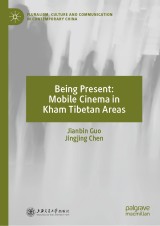Details

Being Present: Mobile Cinema in Kham Tibetan Areas
Pluralism, Culture and Communication in Contemporary China
|
CHF 153.50 |
|
| Verlag: | Palgrave Macmillan |
| Format: | |
| Veröffentl.: | 31.07.2024 |
| ISBN/EAN: | 9789819727360 |
| Sprache: | englisch |
Dieses eBook enthält ein Wasserzeichen.
Beschreibungen
<p>This book presents the restoration of rural mobile cinema network in the Great Triangle region at the conjunction of Yunnan, Sichuan, and Tibet in China in the new century, which has added a new chapter to the long-standing complex relationship between cinema and social change. Based on five years of multi-sited fieldwork, abundant interviews and oral history narratives, this work shows the entanglement of the State, the projectionists and local film viewers in the historical and social context in a holistic analytic framework. By using the key concept of “being present” to examine the tangling relations between the actors in mobile cinema as social practice, the work argues that mobile cinema and contemporary Chinese society are mutually constructed in both textual and practical level.</p>
<p> </p>
<p> </p>
<p>1. 'Being Present' as an Analytical Concept.- 2. Fieldwork area and research methodology.- 3. The 'Presence' of the State and Its Reflection.- 4. The Historical Evolution of Mobile Cinema in the 'Great Trian' Region.- 5. The Film The Serf and its 'Identity Conferment'.- 6. 'The Visual Performance' of the State.- 7. 'Transition' and its Implications.- 8. Touring with Mobile Film Screening Van.- 9. An 'old projectionist' and his successors.- 10. The story of an Individual Projectionist.- 11. From 'Actor' to 'Film herdsman'.- 12. 'Viewers Being Present' and Its Theoretical Implications.- 13. An Investigation of the Film Viewing Practice Among Primary School Students in a Central Primary School.- 14. A study on the Viewing of the Movies The Serf and The Silent Holy Stones.- 15. Watching Movies as a Social Activity.- 16. Film Viewers as 'Interpretive Communities'.- 16. Conclusion: 'Being Present' and Mobile Cinema in Contemporary China.</p>
<p><strong>Guo Jianbin </strong>is a professor at School of Journalism and Communication at Guangzhou Universality, China. As a pioneer and leading scholar in media anthropology in China, he is well-known for his ethnographic studies on communication and social change in Dulong and Tibetan areas. </p>
<p><strong>Chen Jingjing</strong> is an associated professor at School of Journalism, Yunnan University, Kunming, China. </p>
<p><strong>Chen Jingjing</strong> is an associated professor at School of Journalism, Yunnan University, Kunming, China. </p>
<p>This book presents the restoration of rural mobile cinema network in the Great Triangle region at the conjunction of Yunnan, Sichuan, and Tibet in China in the new century, which has added a new chapter to the long-standing complex relationship between cinema and social change. Based on five years of multi-sited fieldwork, abundant interviews and oral history narratives, this work shows the entanglement of the State, the projectionists and local film viewers in the historical and social context in a holistic analytic framework. By using the key concept of “being present” to examine the tangling relations between the actors in mobile cinema as social practice, the work argues that mobile cinema and contemporary Chinese society are mutually constructed in both textual and practical level.</p>
<p><strong>Guo Jianbin </strong>is a professor at School of Journalism and Communication at Guangzhou Universality, China. As a pioneer and leading scholar in media anthropology in China, he is well-known for his ethnographic studies on communication and social change in Dulong and Tibetan areas. </p>
<p><strong>Chen Jingjing</strong> is an associated professor at School of Journalism, Yunnan University, Kunming, China. </p>
<p><strong>Guo Jianbin </strong>is a professor at School of Journalism and Communication at Guangzhou Universality, China. As a pioneer and leading scholar in media anthropology in China, he is well-known for his ethnographic studies on communication and social change in Dulong and Tibetan areas. </p>
<p><strong>Chen Jingjing</strong> is an associated professor at School of Journalism, Yunnan University, Kunming, China. </p>
The first study on mobile cinema in Tibetan areas in China One of the leading media anthropology studies in China A engaging tour with mobile cinema projection team

















